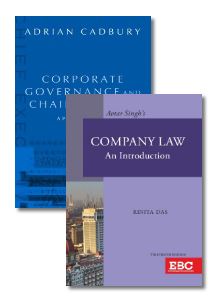EBC Webstore
Eastern Book Company
|
|
 Home > 1st Indian Edition, 2003 and 13th Edition 2022, Reprinted 2024 Home > 1st Indian Edition, 2003 and 13th Edition 2022, Reprinted 2024 |


 5
5
Corporate Governance and Chairmanship - Adrian Cadbury
Adrian Cadbury has had considerable experience of boards and chairmanship in Britain and abroad. He was Chairman of Cadbury Schweppes for 14 years and his board appointments have included the Bank of England and IBM UK Ltd. In 2001, he received the International Corporate Governance Network Award.
Corporate governance has become a major issue in business over the last decade. The book provides a background to the theory of governance and its application in the business world. The author discusses and explains the central issue of corporate governance; provides practical advice to chairmen and directors on their roles and responsibilities; and surveys the major codes of practice that have been developed in the last decade. The author speculates on the implications of electronic developments for shareholders' voice and voting, the extent of a company's social responsibility, and the changing relationship between boards, managers, and investors.
This work is both an informed commentary and a practical guide. The author's insights will prove essential reading for anybody taking on senior roles in companies and other public organizations, and will provide well-grounded analysis for lawyers, management academics, MBA and law students, and advisers. This book is highly relevant for the Company Law course in the LL.B. programme as prescribed in the latest UGC Model Curriculum, valid from July 2002.
This book is highly topical and relevant especially on a discussion on the protection of shareholder and minority rights, and how, in the light of recent accounting scams like those at Enron and Worldcom top management can be controlled and held to account. Further, given how much the subject of corporate governance is in the news: there are strict governance norms that have been included in the new Companies Act and given the increasing importance of the subject, the book would be invaluable for corporate lawyers and MBA students.
Avtar Singh's Company Law An Introduction
Dr Avtar Singh’s Company Law: An Introduction has been revised extensively in light of all the Companies Amendment Acts passed by Parliament to date and it incorporates all amendments that have been made to the Companies Act, 2013. These amendments include changes to relevant definitions related to the substantive provisions and administration of the company for better governance. For example, to promote transparency, the Companies (Amendment) Act, 2019 has provided for physical verification of the registered office of a company if the Registrar has reason to believe that the company is not carrying on any business or operations. The updated CSR provisions have also been included which allow the company to contribute to many more areas. The book also includes the revised penalties for violation of provisions of the Act in light of the Amendment Act of 2020 that has decriminalised various offences. Imprisonment as punishment has been removed for contravention of the Sections relating to buy back of securities, financial statements and board reports, and disqualification of directors being some of the important changes. The Amendment Acts have also provided for the imposition of stringent punishment for repeated offences which should lead to corporate governance reforms. This book further discusses the provisions relating to the registration and incorporation of the company, removal of the name of the company from the register along with provisions relating to winding up and annulment of dissolution. Mediation and conciliation form a very prominent aspect of the law in corporate disputes which have also been discussed.
The chapters of the book have been suitably rearranged by the revising author Prof. Rinita Das to reflect a more logical flow of topics and avoid repetition. This book is further enriched by the cases as decided by the courts from time to time. Corporate personality and its administration centres on the opinion of the courts as decided by Bengal Chemists & Druggists Assn v Kalyan Chowdhury, (2018) 3 SCC 41, Hooghly Mills Co. Ltd. v. State of W.B., (2020) 18 SCC 568 and Shailendra Swarup v Directorate of Enforcement, (2020) 16 SCC 561 etc. and are integrated throughout the book to illustrate key topics.
This book shall be especially helpful for the students pursuing professional courses like LL B, LL M, CA, CS and ICWA. It should also come to the aid of young associates interested in Corporate Law, Company Secretaries and Managers.
|
|
||
|
||
|